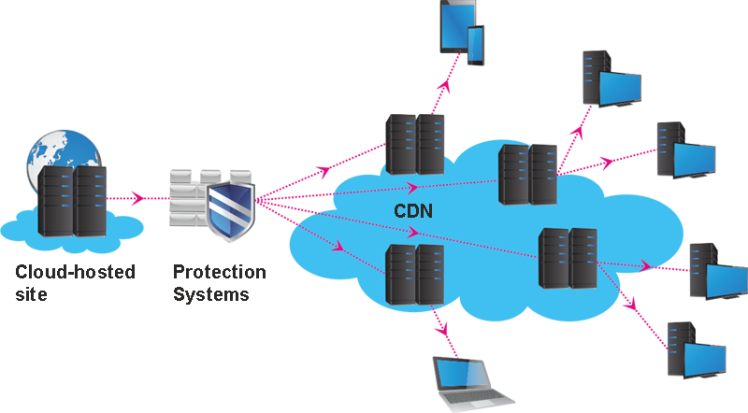Comparative Study Between CDN, Cloud and Common Website Hosting

Shared Hosting
If you’re looking for a reliable and affordable way to host your website, shared hosting may be the solution for you. Shared hosting is a type of web hosting in which your site shares space on a server with other sites. This can be an economical option if you’re just starting out or don’t have a lot of traffic to your site.
One thing to keep in mind when considering shared hosting is that because your site is sharing resources with others, it may not be as fast or as reliable as other types of hosting options. Additionally, since there are so many websites hosted on one server, it’s possible that another site could overload the server and affect yours negatively. For this reason, it’s important to do some research before selecting a shared host provider to ensure that they have good reviews and offer quality service stability guarantees.
There are many companies that provide shared hostings like Godaddy, BlueHost, and Namecheap. You can get a 93% discount coupon from Couponfond.
CDN Service

Source: akamai.com
A content delivery network (CDN) is a system of computers that work together to speed up the distribution of digital content, such as images, videos, and text files. A CDN works by caching frequently-requested static files on servers that are located near the users who need them. This approach helps reduce response times and improves overall website performance.
When you use a CDN service, your site’s visitors will be directed to the nearest server location for optimal download speeds. In addition, using a CDN can help improve your website’s search engine ranking because it ensures faster page load times for all users – including those from far away geographies.
Cloud Hosting
Cloud hosting is a type of web hosting that allows businesses to access data and applications from remote servers over the internet. Rather than storing information on physical hardware, cloud-based systems store it on vast networks of interconnected computers “in the cloud”. This makes them much more scalable and efficient – businesses only pay for what they use, with no need for investment in expensive on-premises infrastructure.
There are several different types of cloud hosting services available, but all share some key benefits:
- Rapid deployment – Cloud providers can easily spin up new servers as demand requires, so your business can get up and running quickly without having to invest in server hardware or management resources upfront.
- Flexible pricing – You only pay for what you use, making it an extremely cost-effective option compared to traditional hosted solutions (or self-hosting). No surprise bills!
- Scalability – Because your resources are not tied down to any specific piece of hardware, you can scale capacity up or down as needed; perfect for seasonal traffic spikes or unexpected surges in usage.
Disaster Recovery & Business Continuity Planning– In the event that something happens (e.g., fire) preventing employees from accessing company files/applications locally.
Connection between Cloud and CDN regarding their performance

Source: cloud4y.ru
Cloud and CDN are both important aspects of online performance. Cloud computing is a way to deliver applications over the Internet, which makes it possible for users to access information from any device or computer with an Internet connection. A CDN (Content Delivery Network) caches copies of static Web content, such as images, videos, audio files, and software downloads on servers placed at strategic locations around the world so that website visitors can download them faster.
CDNs have been used for many years to improve website performance by reducing latency and packet loss. However, they are also becoming important in cloud deployments because they provide a way to offload traffic from public clouds during times of peak demand while improving application availability and reliability. When implemented together as part of an overall hybrid cloud strategy, these two technologies can help you optimize your environment for maximum performance and scalability.
Traditional Hosting
Traditional web hosting is a service that provides individuals and organizations with the space and tools they need to create, publish, and manage their websites. It usually involves renting or purchasing server space from a provider who then maintains the infrastructure for your website. This can include everything from setting up your account to installing software and managing security updates.
Traditionally, in order to have a website you needed either coding knowledge or money to hire someone who did. With traditional web hosting, providers take care of all of that for you so you don’t have to worry about it – all you need is an idea for a site and some content ready to go!
All this comes at a price, however; most traditional hosts charge by the month (or year) for access to their servers. This can add up quickly if your traffic levels are high or if you plan on using more advanced features like eCommerce functionality or dynamic content management systems (CMSs).
SSD and HDD Hosting

Source: inmotionhosting.com
There are many options for hosting your website, including SSD and HDD hosting. So what’s the difference? And which one is right for you?
The main difference between SSD and HDD hosting is that with an SSD drive, data is stored on interconnected flash memory chips. This makes retrieval much faster than traditional hard drives, where data is spread out over spinning disks. As a result, sites hosted on SSDs tend to perform better overall – especially when it comes to loading times.
This isn’t to say that HDDs are slow by any means; they remain a popular choice among hosts thanks to their affordability and large storage capacities But if speed is your number one priority (especially if you’re expecting high volumes of traffic), then SSD may be the best option for you.





